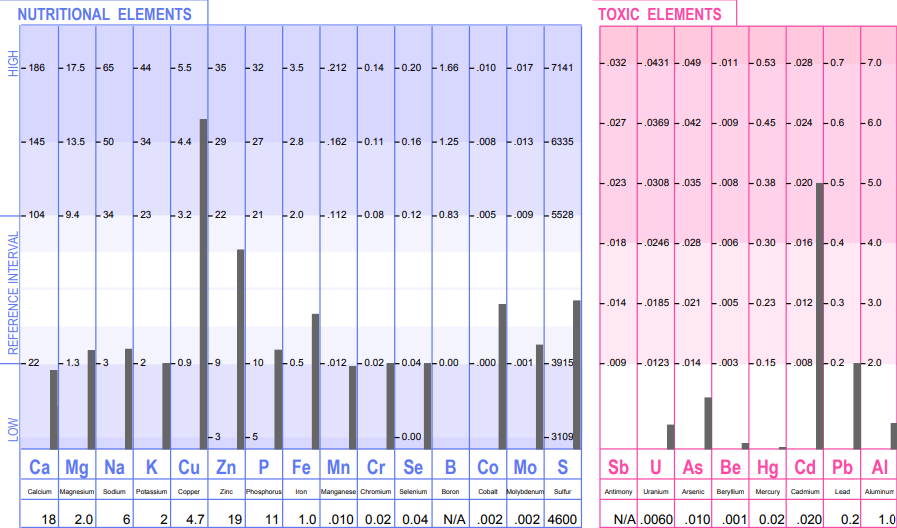The Complete Guide to HTMA Testing: What Your Hair Reveals About Your Health
Imagine if your hair could help you understand why you’re exhausted, why your hormones are off, or why you can’t seem to lose weight, no matter how clean your diet is?
Just like the spark plugs in a car ignite the fuel to power the engine, minerals are the spark plugs of the body.
They power the reactions in your cells that make energy, regulate your hormones, digest your food and facilitate detoxification.
When minerals are depleted or out of balance, you’ll feel like you’re running on empty and pushing through exhaustion, everyday.
Yet, they’re largely overlooked in mainstream health.
That’s where Hair Tissue Mineral Analysis (HTMA) comes in.
Hair Tissue Mineral Analysis (HTMA) is a simple, non-invasive test that uses a small sample of hair to assess your body’s mineral levels. HTMA provides key insights into your long-term mineral balance, which is essential for energy, gut health, hormone balance, skin health and metabolism.
By analyzing a small sample of hair, HTMA can uncover hidden imbalances that blood tests often miss.
The information from an HTMA test provides valuable insights into the root causes of your symptoms. Most importantly, it helps us understand what foods and nutrients your body needs most so that we can create a nutrition and supplement plan, specific to your imbalances.
.
What Can HTMA Testing Reveal?
Since minerals play such a crucial role in the functioning of your gut and hormones, HTMA helps us understand how well your adrenals are functioning, if your thyroid needs support, or why your hormones are out of balance.
Some of the most common insights we get from HTMA are:
Adrenal function: The sodium-to-magnesium ratio is called the adrenal ratio. This ratio gives us a window into how your adrenal glands are functioning and how your body is responding to stress.
Thyroid activity: Certain mineral patterns mimic hypothyroidism, even if blood tests look “normal.” The calcium-to-potassium ratio helps us understand how well your thyroid hormones are being utilized at a cellular level.
Blood sugar regulation: Imbalances in minerals like calcium, magnesium and potassium can make it harder to keep blood sugar stable. Blood sugar swings are usually to blame for those afternoon crashes, sugar cravings and belly weight that won’t budge.
Gut health: Low levels of minerals like sodium and potassium lead to poor digestion and nutrient absorption from food.
Heavy Metal accumulation: HTMA can detect the presence of heavy metals that can interfere with your body’s ability to use essential minerals, disrupt your hormone balance, slow your metabolism, and contribute to chronic inflammation.
Who is HTMA For?
HTMA is especially helpful for women who:
Feel burned out and exhausted, no matter how much they sleep
Struggle with PMS, heavy periods, or perimenopause symptoms
Suspect they have a thyroid imbalance, despite normal blood work
Deal with bloating or constipation
Are tired of being told their labs are normal when they know something in their body is off
HTMA sample report
How does the HTMA process work?
One of the best things about HTMA testing is how simple and non-invasive it is. You’ll collect the sample at home and it only takes 2-3 minutes to do!
It’s such a small amount that even with fine hair, you won’t notice a difference after you’ve cut your sample. The test kit comes with a little scale so you’ll know exactly how much to cut.
After you’ve collected your sample, you’ll mail it to the lab to be analyzed.
Then, we’ll go over your results together!
Instead of guessing what your body needs, we’ll create a personalized plan, outlining the foods, lifestyle shifts, and supplements that will help to correct your body’s imbalances.
The chart probably looks confusing but that’s why working with a qualified HTMA practitioner who can interpret it for you, is so important!
A personalized plan
Based on your individual results, you’ll get a detailed protocol with nutrition, lifestyle and supplement recommendations to follow. The focus will be on what you can add into your current diet and lifestyle, rather than what you need to take out.
Ready to finally get answers about your health?
Book your HTMA consult here!

